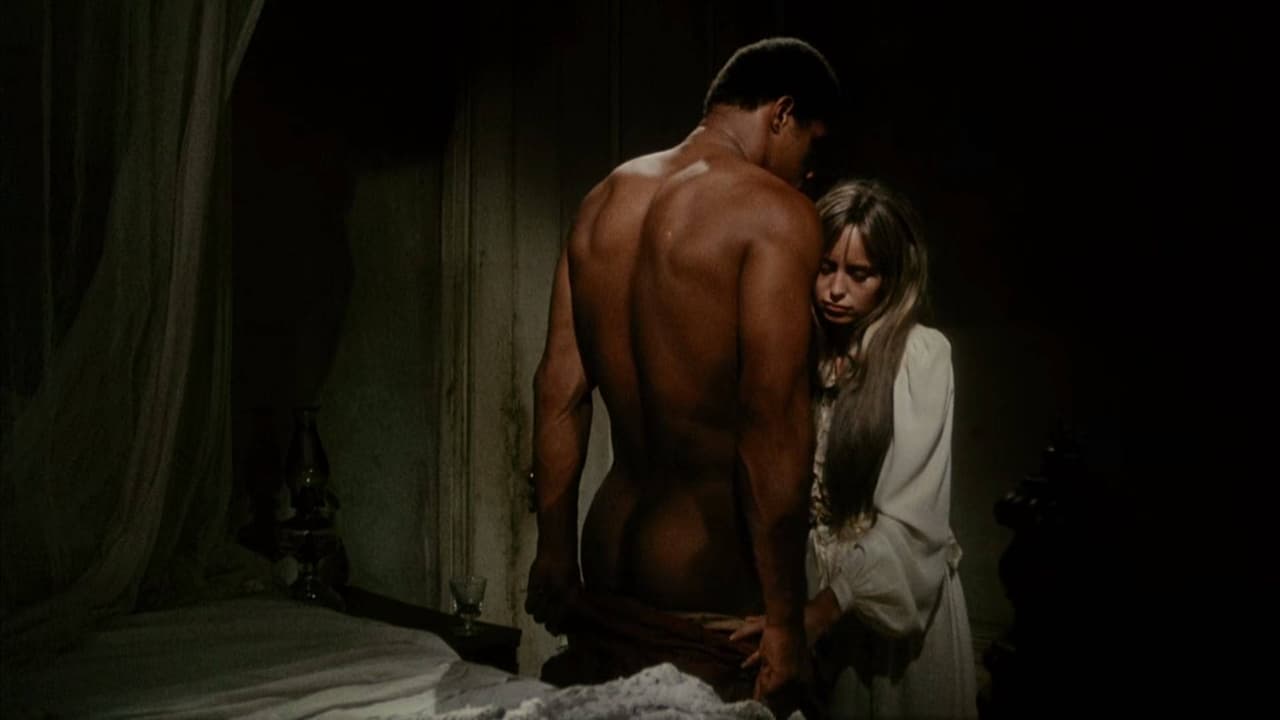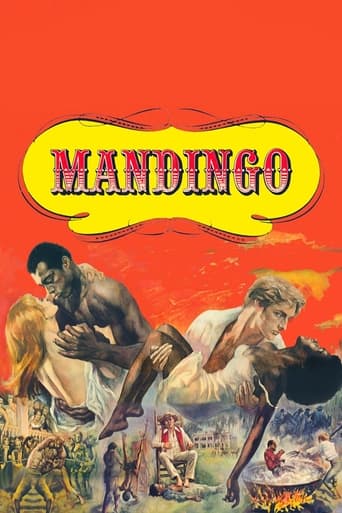

Quentin Tarantino has called Mandingo one of the few big budget exploitation films Hollywood has ever produced, and you can definitely see a lot of this film in his Django Unchained. I'm not sure I'd go as far as calling this an exploitation film, but it's certainly startling at times and deals with the subject of slavery without backtalk or ambiguity.The movie takes place in Deep South prior to the American Civil War. Slavery is at its highest bloom and it's just as bad as you've probably heard. First night rights are freely exercised, slaves are just one step above animals, sold like cattle and while they're not beaten daily – they still need to work, and it's not like you beat your cows daily, either – it doesn't take much for them to incur the wrath of their masters.The movie is also notable in that it uses the term 'mandingo' somewhat correctly. The term referred to any slave of the highest quality and not just to those who fought against one another. Though even that fighting might be a myth. The movie tells the tale of one particular manor, its owners and the pair of mandingo slave that were brought there, one of them to be trained as a fighter.It's a tough movie to sit through if you're squeamish and while it's not overly gluttonous in its depictions of violence, like Django Unchained is, it doesn't shy away from them either or pull its punches. A very good movie to check out if you liked Django and/or are looking for a darker historical piece.
... View MoreWith having heard a while ago about the obviously large impact that the 1966 Sergio Corbucci Spaghetti Western Django had had on Quentin Tarantino's very own Django Unchained,I was pleased to discover,that along with the Spaghetti Western,people were also mentioning online about two connected films that looked at slavery in America called Mandingo and Drum.The plot:Having recently made a good amount of cash from selling off some of his slaves with his dad,Hammond Maxwell decides to celebrate by going with a friend to buy a slave who he can use for sexual activates (who he calls a "wench").Being initially timed in front of his new slave, (Ellen) Hammond is shock to witness his friend abuse his new slave in an extremely aggressive manner,which leads Hammond to decide to treat Ellen in a much kinder manner.With still having a huge amount of cash left on him,Hammond goes out to an auction sight,where he instantly spots a slave (called Mede) who is in incredible shape.Finding that a German woman is desperate to win Mede for use in the bedroom,Maxwell uses every penny he has left,until he wins the auction,with Mede becoming his new slave.Thrilled with the investment that his son made in Mede,Warren Maxwell feels less than happy at how close his son is getting to Ellen,which leads to Warren quickly arranging a marriage for Hammond to socialite Blanche. As the wedding guests start to celebrate (and Hammond continues to think about Ellen),Mede gets into a fight with a fellow slave who he quickly destroys in a hard knuckle battle.Astonished by Mede's fighting skills,Hammond decides that instead of punishing Mede,he could actually make back all the money that was spent on buying him,by entering Mede into brutal,fight to the death,slave v slave "mandingo" fighting..View on the film:Opening with a scene where a potential buying is checking a slave for hemorrhoids,the refreshing adaptation of the "mandingo" novels by Kyle Onstott and a failed Broadway show by Jack Kirkland, (starring Dennis Hooper!) by Norman Wexler keeps the traditional south setting of movies which look at slavery in America,whilst rooting out all of the self- rigorous smugness usually connected with historical slavery movies,to instead create a film that is raw ruthless,and also a whole lot of fun!.Giving each of the characters cracking dialogue,Wexler hits every nerve of the viewer's expectations by making the dialogue blunt and raw,with the screenplay never treating the viewer in a condescending or preaching manner,but instead showing the audience nakedly the sheer harsh attitude that the Maxwell's have towards their slaves,which goes from hitting one of them on the bottom until it is bleeding,to pushing any of them to the ground,to keep them in their place.Whilst Wexler does suggest some southern charm romance developing between Warren Maxwell's (played by a deranged Foghorn Leghorn like James Mason) son Hammond (played by an excellent Perry King) and "wench" Ellen, (played by the wonderful Brenda Sykes) he smartly keeps away from dropping the movie into melodrama clichés,by making the romance one that thrillingly goes out of the frying pan and into the fire,due to Hammond never being able to get out of the mindset,that no matter how kind and courteous Ellen is,he will always see her as someone even lower than dirt.Tragicly having to cut his original 4 hour version down to 2 due to studio demands,director Richard Fleischer still makes this deep-fried southern tale a joy to watch.Showing the eye catching real locations with long walk & talk shots,Fleischer makes crimson a the main prominent colour in the film,from the tops that the characters wear to the colour of building in the background,which help to create an intense atmosphere that is only diluted in the moments of raw,bloody violence in the movie.With the marriage between Hammond and Blanche (played by a perfectly crumbling Susan George) being forced by Hammond's dad,Fleischer places (and shoots a number of scenes between them from) a mirror to show Hammond and Blanche real reflections,which each look to have come from a Horror movie, (with a scene between Blanche and Ellen being particularly tough) as Blanche starts to plan on how to use Mede (played with the right mix of stern and good innocence by Ken Norton) for her own deadly "Mandingo" game.
... View MoreThis film is supposedly set in the 1840s South. In it, white men spend all of their time raping and torturing slaves. And, when they are not doing this, they are talking about raping and torturing slaves! They seem to have almost no life apart from this--no jobs, no family life, no hobbies...nothing. There is a plot where Perry King wants to exploit a black slave (Ken Norton) as a bare-knuckle fighter. But it's really all about the raping and beatings and it's very one-dimensional and stupid. Now I am NOT defending slavery or saying slaves weren't molested. But this came off like a cartoon or a film about the days of slavery if it were written by Bob Guccione. While a superficial level it looks a bit like a historical film, it soon becomes apparent that it's much, much more focused on offending and titillating instead educating or enlightening. In many ways, it comes off more like a porno movie laced with LOTS of sadism than anything else. And I wonder about the sort of folks who would LIKE to see this sort of crap. Who wants to see men and women being savagely beaten?! And, while many might want to see the sex and nudity, since it isn't consensual, who wants to watch a long series of rapes?! No wonder this film caused a stir when it debuted--it's terrible history, salacious and just plain nasty.Now it could be argued that although the film is very offensive, slavery WAS offensive or that at least the film was well-made. Sadly, however, the film is chock full 'o rotten over-acting. Bad accents (James Mason's was just awful), goofy smiles and leers as well as absolutely no subtlety are the best ways to describe the acting and you can't help but wonder if the director was insane or a chipmunk. In fact, any episode of "The Beverly Hillbillies" was acted and written MUCH more subtlety and believably! It's just bad on every level and apart from some nice costumes, there isn't anything positive I could see in it. It's definitely one of the worst movies of the 1970s--made worse by its big budget which was totally wasted.Some dumb scenes (apart from the rapings and beatings) include seeing Mason's rheumatism treated by sleeping with his feet on a naked black kid's belly(?!?!), the "...never, never, never, never done it!!!!" tirade as well as every love scene between Perry King and Susan George...every last one of them.Needless to say, there is LOTS of nudity (including full-frontal) in the film and I am actually surprised that it was only rated R. It's probably NOT a good film to rent to see with your kids or mother or anyone with taste. Perhaps bad movie buffs might find it all funny--but even bad movie buffs will probably be too offended to care.
... View MoreRichard Fleischer directs a hot-blooded drama set in the Deep South circa 1840. Warren Maxwell(James Mason)lords over a rundown plantation and his son Hammond(Perry King)travels to New Orleans in hopes of purchasing a top-of-the-line fighting slave, a Mandingo. Hammond finds a real gem in Mede( boxer Ken Norton)at an auction and plans on making a fortune by way of his fighting prowess. Back on the plantation, Master Maxwell puts the pressure on his son to produce an heir. He has his dark winches, but is all but forced to marry an alabaster-skinned Blanche(Susan George). When Hammond discovers she is not a virgin the marriage is a sham. Love, hate, deceit and murder.Very provocative for the mid '70s and a very talked about film. A little over two hours in length with some very sordid and graphic scenes. MANDINGO is based on the novel by Kyle Onstott and produced by Dino De Laurentiis. Also in the cast: Brenda Sykes, Lillian Haymann, Ben Masters, Paul Benedict and Richard Ward.
... View More